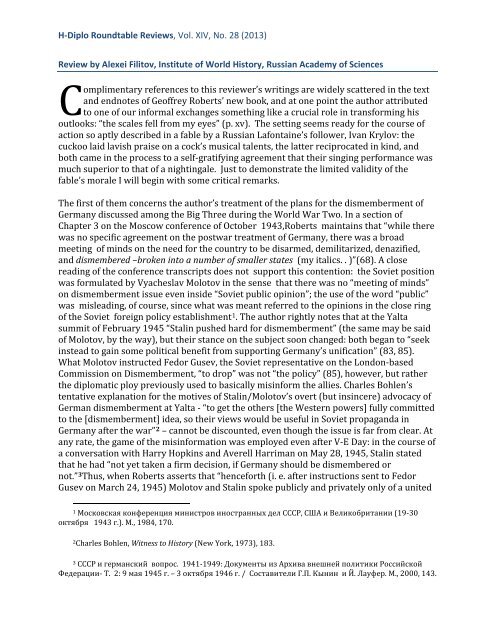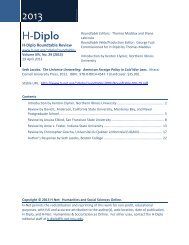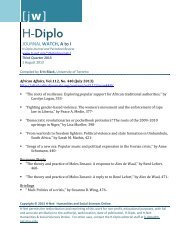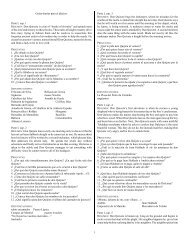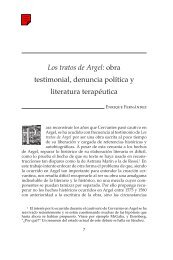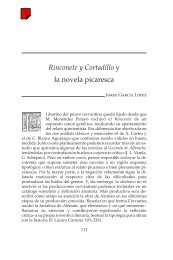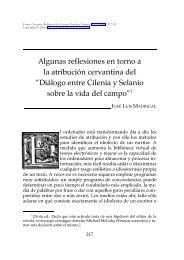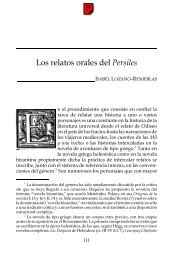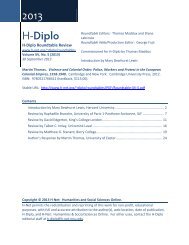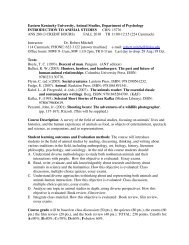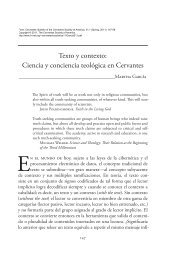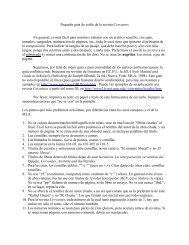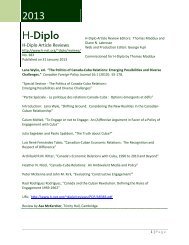H-Diplo Roundtable on Geoffrey Roberts. Molotov - H-Net
H-Diplo Roundtable on Geoffrey Roberts. Molotov - H-Net
H-Diplo Roundtable on Geoffrey Roberts. Molotov - H-Net
Create successful ePaper yourself
Turn your PDF publications into a flip-book with our unique Google optimized e-Paper software.
H-<str<strong>on</strong>g>Diplo</str<strong>on</strong>g> <str<strong>on</strong>g>Roundtable</str<strong>on</strong>g> Reviews, Vol. XIV, No. 28 (2013)<br />
Review by Alexei Filitov, Institute of World History, Russian Academy of Sciences<br />
C<br />
omplimentary references to this reviewer’s writings are widely scattered in the text<br />
and endnotes of <strong>Geoffrey</strong> <strong>Roberts</strong>’ new book, and at <strong>on</strong>e point the author attributed<br />
to <strong>on</strong>e of our informal exchanges something like a crucial role in transforming his<br />
outlooks: “the scales fell from my eyes” (p. xv). The setting seems ready for the course of<br />
acti<strong>on</strong> so aptly described in a fable by a Russian Laf<strong>on</strong>taine’s follower, Ivan Krylov: the<br />
cuckoo laid lavish praise <strong>on</strong> a cock’s musical talents, the latter reciprocated in kind, and<br />
both came in the process to a self-gratifying agreement that their singing performance was<br />
much superior to that of a nightingale. Just to dem<strong>on</strong>strate the limited validity of the<br />
fable’s morale I will begin with some critical remarks.<br />
The first of them c<strong>on</strong>cerns the author’s treatment of the plans for the dismemberment of<br />
Germany discussed am<strong>on</strong>g the Big Three during the World War Two. In a secti<strong>on</strong> of<br />
Chapter 3 <strong>on</strong> the Moscow c<strong>on</strong>ference of October 1943,<strong>Roberts</strong> maintains that “while there<br />
was no specific agreement <strong>on</strong> the postwar treatment of Germany, there was a broad<br />
meeting of minds <strong>on</strong> the need for the country to be disarmed, demilitarized, denazified,<br />
and dismembered –broken into a number of smaller states (my italics. . )”(68). A close<br />
reading of the c<strong>on</strong>ference transcripts does not support this c<strong>on</strong>tenti<strong>on</strong>: the Soviet positi<strong>on</strong><br />
was formulated by Vyacheslav <strong>Molotov</strong> in the sense that there was no “meeting of minds”<br />
<strong>on</strong> dismemberment issue even inside “Soviet public opini<strong>on</strong>”; the use of the word “public”<br />
was misleading, of course, since what was meant referred to the opini<strong>on</strong>s in the close ring<br />
of the Soviet foreign policy establishment 1 . The author rightly notes that at the Yalta<br />
summit of February 1945 “Stalin pushed hard for dismemberment” (the same may be said<br />
of <strong>Molotov</strong>, by the way), but their stance <strong>on</strong> the subject so<strong>on</strong> changed: both began to “seek<br />
instead to gain some political benefit from supporting Germany’s unificati<strong>on</strong>” (83, 85).<br />
What <strong>Molotov</strong> instructed Fedor Gusev, the Soviet representative <strong>on</strong> the L<strong>on</strong>d<strong>on</strong>-based<br />
Commissi<strong>on</strong> <strong>on</strong> Dismemberment, “to drop” was not “the policy” (85), however, but rather<br />
the diplomatic ploy previously used to basically misinform the allies. Charles Bohlen’s<br />
tentative explanati<strong>on</strong> for the motives of Stalin/<strong>Molotov</strong>’s overt (but insincere) advocacy of<br />
German dismemberment at Yalta - “to get the others [the Western powers] fully committed<br />
to the [dismemberment] idea, so their views would be useful in Soviet propaganda in<br />
Germany after the war” 2 – cannot be discounted, even though the issue is far from clear. At<br />
any rate, the game of the misinformati<strong>on</strong> was employed even after V-E Day: in the course of<br />
a c<strong>on</strong>versati<strong>on</strong> with Harry Hopkins and Averell Harriman <strong>on</strong> May 28, 1945, Stalin stated<br />
that he had “not yet taken a firm decisi<strong>on</strong>, if Germany should be dismembered or<br />
not.” 3 Thus, when <strong>Roberts</strong> asserts that “henceforth (i. e. after instructi<strong>on</strong>s sent to Fedor<br />
Gusev <strong>on</strong> March 24, 1945) <strong>Molotov</strong> and Stalin spoke publicly and privately <strong>on</strong>ly of a united<br />
1 Московская конференция министров иностранных дел СССР, США и Великобритании (19-30<br />
октября 1943 г.). М., 1984, 170.<br />
2 Charles Bohlen, Witness to History (New York, 1973), 183.<br />
3 СССР и германский вопрос. 1941-1949: Документы из Архива внешней политики Российской<br />
Федерации- Т. 2: 9 мая 1945 г. – 3 октября 1946 г. / Составители Г.П. Кынин и Й. Лауфер. М., 2000, 143.


